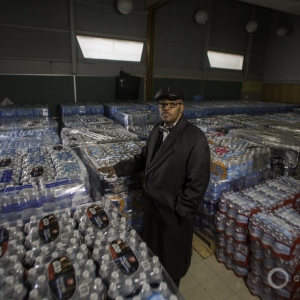The Stream, January 7, 2021: New EPA Rule Limits Research Scientists Can Use In Future Regulations
GLOBAL DAILY WATER NEWS
- The U.S. EPA finalizes a new rule that limits the use of certain scientific studies when writing regulations.
- A Chilean mining company will spend $56 million to reduce water overuse at a Salvador mine.
- Reservoir levels in a United Kingdom community are being lowered to save the town from potential flooding.
- A Michigan judge invalidates a wetlands permit for an Upper Peninsula mine.
A new report gives water quality in the Chesapeake Bay an almost failing grade.
“Saving Chesapeake Bay will be a source of great pride for America and an early step in addressing climate change.” – William Baker, president of the Chesapeake Bay Foundation (CBF). A new report from CBF gave the Chesapeake Bay, the largest estuary in the United States, a D-plus grade for its overall health. The Associated Press reports that the grade for the bay’s health remained the same as it was two years ago, when the last report was released. Most water quality measures are showing improvements, the foundation said, but efforts need to be accelerated by 2025 to restore water quality to local rivers, streams and the bay.
IN RECENT WATER NEWS
Years After Flint Water Crisis, Lead Lingers in School Buildings
The federal appropriations bill for the 2021 fiscal year, signed into law this week, included $26.5 million to test for lead in schools and child care centers, a nod to the legacy of the Flint water crisis, which lifted the issue of lead in drinking water into the national spotlight.
The bill was signed a week after the U.S. Environmental Protection Agency introduced new requirements for water utilities to test water in elementary schools and day cares for lead.
India Has Water for Its Economic Plans – If Farms Can Be More Thrifty
India’s leaders have ambitious goals for the country’s economy, aiming with the Make in India campaign to lift the manufacturing sector to a place of prominence.
To do that, they will have to answer what Vaibhav Chaturvedi says is one of the country’s biggest policy questions: how to reduce water use by farmers.
Farming is where the water is in India, accounting for nearly 80 percent of the country’s water withdrawals. Farming is also where the labor is, employing more than two in five workers. Even with this arsenal, India’s farmers are some of the world’s least efficient users of water, and conflicts over water supplies are a frequent occurrence in a country beset by stifling heat, rampant groundwater depletion, diminishing reservoirs, ad 1.4 billion people.
In Case You Missed It:
Four U.S. Water Stories to Watch in 2021 – The upheaval of the last year will set the stage for the next 12 months.
HotSpots H2O: Minnesota Pipeline Opponents File Federal Lawsuit to Halt Construction – Two Minnesota Ojibwe communities and two environmental organizations filed a lawsuit against the Line 3 oil pipeline in order to halt construction in that state, alleging that the U.S. Army Corps of Engineers issued the project’s water quality permit without appropriate consideration of several environmental issues.
New EPA Rule Limits What Scientific Research The Agency Can Use To Formulate Regulations
The U.S. Environmental Protection Agency (EPA) will no longer be able to rely on scientific research based on confidential medical and industry data, according to a new rule finalized Monday. Reuters reports opponents of the rule say it will make it harder to craft air and water regulations and would harm human heath protections. In an opinion piece for the Wall Street Journal, EPA Administrator Andrew Wheeler said the new rule allows for more public scrutiny of the science used in rulemaking and that his agency has historically relied on “secret science.”
TODAY’S TOP WATER STORIES, TOLD IN NUMBERS
$1.4 BILLION
The Chilean state-owned copper miner Codelco has approved a $1.4 billion budget for the renovation of its Salvador mine, Reuters reports. The news comes a week after an environmental court approved a $56 million action plan between Codelco and the nation’s government to remedy 36 years of water overuse at the mine.
In context: Unearthing Water Risks of the Global Mining Industry
10 PERCENT
Reservoir levels above Hebden Bridge, England are being lowered by 10 percent to prevent the town from flooding, BBC reports. Yorkshire Water, the area’s water utility, said it hopes reducing reservoir levels will create extra capacity if sudden downpours occur. The U.K. Environment Agency, which will monitor rivers to assess the impact of drawing water from reservoirs, supports the practice, which began as a trial in 2017.
ON THE RADAR
Administrative Law Judge Daniel Pulter invalidated a wetlands permit for a proposed open-pit mine in Michigan’s Upper Peninsula, providing yet another setback for a contentious project two decades in the making. The Associated Press reports that the permit was granted in 2018 to Aquila Resources Inc. by environmental regulators in former Gov. Rick Snyder’s administration. Regulators in the same agency, now part of Democratic Gov. Gretchen Whitmer’s administration, sided with the judge’s decision on Tuesday. Environmental groups and the Menominee Indian Tribe of Wisconsin also oppose the mine, which they say would lower the groundwater table, harm wetlands and expose the river to acidic runoff that can form when sulfide minerals are exposed to air and water.
Jane is a Communications Associate for Circle of Blue. She writes The Stream and has covered domestic and international water issues for Circle of Blue. She is a recent graduate of Grand Valley State University, where she studied Multimedia Journalism and Women, Gender and Sexuality Studies. During her time at Grand Valley, she was the host of the Community Service Learning Center podcast Be the Change. Currently based in Grand Rapids, Michigan, Jane enjoys listening to music, reading and spending time outdoors.






Leave a Reply
Want to join the discussion?Feel free to contribute!